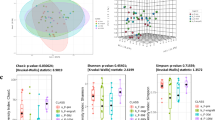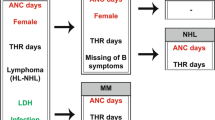Abstract
Purpose
The study aimed to characterize the incidence of both oral and gastrointestinal (GI) mucositis, its’ associated temporal changes in local and systemic pro-inflammatory cytokines, and to explore predictive clinical and immunological factors associated with their occurrences in hematopoietic stem cell transplant (HSCT).
Methods
Autologous HSCT patients aged 18 years old and above were recruited from Hospital Ampang, Malaysia, between April 2019 to December 2020. Mucositis assessments were conducted daily, whilst blood and saliva were collected prior to conditioning regimen, on Day 0, Day+7 and 6-month. Baseline and inflammatory predictors in a repeated time measurement of moderate-severe mucositis were assessed by multiple logistic regression and generalized estimating equations, respectively.
Results
Of the 142 patients analyzed, oral mucositis and diarrhea (representing GI mucositis) were reported as 68.3% and 95.8%, respectively. Predictive factors for moderate-severe oral mucositis were BEAM or busulphan-based regimens (odds ratio (OR)=9.2, 95% confidence interval (CI)=1.16–72.9, p-value (p) = 0.005) and vomiting (OR=4.6, 95% CI 1.68–12.3, p = 0.004). Predictive factors for moderate-severe GI mucositis were BEAM or busulphan-based regimens (OR=3.9, 95% CI 1.05–14.5, p = 0.023), female sex (OR = 3.3, 95% CI 1.43–7.44, p = 0.004) and body mass index (OR=1.08, 95% CI 1.02–1.15, p = 0.010). Cytokines analyses were performed in 96 patients. Saliva and plasma interleukin-6 (OR=1.003, 95% CI 1.001–1.004, p < 0.001 and OR=1.01, 95% CI 1.001–1.015, p = 0.029), and plasma tumor necrosis factor-alpha (OR=0.91, 95% CI 0.85–0.99, p = 0.019) were predictive of moderate-severe oral mucositis in a time-dependent model.
Conclusion
This study provides real-world evidence and insights into patient- and treatment-related factors affecting oral and GI mucositis in HSCT.


Similar content being viewed by others
Data availability
The data that support the findings of this study are available from the corresponding author on reasonable request. The data are not publicly available due to privacy and ethical restrictions.
References
Soiffer RJ (2004) Stem Cell Transplantation for Hematologic Malignancies. Humana Press, Totowa, New Jersey
Peterson DE (2011) Oral and gastrointestinal mucosal adverse effects. In: Supportive Oncology, 1st edn. Elsevier Health Sciences, London, pp 102–114
Sonis ST, Elting LS, Keefe D et al (2004) Perspectives on cancer therapy-induced mucosal injury: pathogenesis, measurement, epidemiology, and consequences for patients. Cancer 100:1995–2025. https://doi.org/10.1002/cncr.20162
Vagliano L, Feraut C, Gobetto G et al (2011) Incidence and severity of oral mucositis in patients undergoing haematopoietic SCT-results of a multicentre study. Bone Marrow Trans 46:727–732. https://doi.org/10.1038/bmt.2010.184
Dodd MJ, Dibble S, Miaskowski C et al (2001) A comparison of the affective state and quality of life of chemotherapy patients who do and do not develop chemotherapy-induced oral mucositis. J Pain Symptom Manage 21:498–505
Sonis ST (2009) Mucositis: The impact, biology and therapeutic opportunities of oral mucositis. Oral Oncol 45:1015–1020. https://doi.org/10.1016/j.oraloncology.2009.08.006
Keefe DMK, Gibson RJ, Hauer-Jensen M (2004) Gastrointestinal mucositis. Semin Oncol Nurs 20:38–47. https://doi.org/10.1053/j.soncn.2003.10.007
Çakmak S, Nural N (2019) Incidence of and risk factors for development of oral mucositis in outpatients undergoing cancer chemotherapy: Oral Mucositis in Outpatients with Cancer. Int J Nurs Pract 25:e12710. https://doi.org/10.1111/ijn.12710
Drustrup L, Holst M (2017) Nutritional Risk and Risk of Mucositis in Patients Treated with HDT Prior to Stem Cell Transplantation. J Clin Nutr Metab 1:1–5
Gebri E, Kiss A, Tóth F, Hortobágyi T (2020) Female sex as an independent prognostic factor in the development of oral mucositis during autologous peripheral stem cell transplantation. Sci Rep 10:15898. https://doi.org/10.1038/s41598-020-72592-5
Gordillo C, Parmar S, Blanco M et al (2021) Gastrointestinal Toxicity of High-Dose Melphalan in Autologous Stem-Cell Transplantation: Identification of Risk Factors and a Benchmark for Experimental Therapies. Ann Hematol 100:1863–1870. https://doi.org/10.1007/s00277-020-04378-8
Kashiwazaki H, Matsushita T, Sugita J et al (2012) Professional oral health care reduces oral mucositis and febrile neutropenia in patients treated with allogeneic bone marrow transplantation. Support Care Cancer 20:367–373. https://doi.org/10.1007/s00520-011-1116-x
Robien K, Schubert MM, Bruemmer B et al (2004) Predictors of Oral Mucositis in Patients Receiving Hematopoietic Cell Transplants for Chronic Myelogenous Leukemia. J Clin Oncol 22:1268–1275. https://doi.org/10.1200/JCO.2004.05.147
Vokurka S, Steinerova K, Karas M, Koza V (2009) Characteristics and risk factors of oral mucositis after allogeneic stem cell transplantation with FLU/MEL conditioning regimen in context with BU/CY2. Bone Marrow Transplant 44:601–605. https://doi.org/10.1038/bmt.2009.66
Vokurka S, Chvojkova I, Svoboda T et al (2014) The impact of oral cryotherapy and oral and gastrointestinal mucositis after autologous stem cell transplantation. Eur J Oncol Nurs 18:228–229. https://doi.org/10.1016/j.ejon.2013.11.001
Legert KG, Tsilingaridis G, Remberger M et al (2014) The relationship between oral mucositis and levels of pro-inflammatory cytokines in serum and in gingival crevicular fluid in allogeneic stem cell recipients. Support Care Cancer 23:1749–1757. https://doi.org/10.1007/s00520-014-2538-z
Fall-Dickson JM, Ramsay ES, Castro K et al (2007) Oral mucositis-related oropharyngeal pain and correlative tumor necrosis factor-alpha expression in adult oncology patients undergoing hematopoietic stem cell transplantation. Clin Ther 29(Suppl):2547–2561. https://doi.org/10.1016/j.clinthera.2007.12.004
Amaral TMP, Campos CC, Moreira dos Santos TP et al (2012) Effect of salivary stimulation therapies on salivary flow and chemotherapy-induced mucositis: a preliminary study. Oral Surg Oral Med Oral Pathol Oral Radiol 113:628–637. https://doi.org/10.1016/j.oooo.2011.10.012
Logan RM, Al-Azri AR, Bossi P et al (2020) Systematic review of growth factors and cytokines for the management of oral mucositis in cancer patients and clinical practice guidelines. Support Care Cancer 28:2485–2498. https://doi.org/10.1007/s00520-019-05170-9
World Health Organization (WHO) (1979) WHO handbook for reporting results of cancer treatment. World Health Organization, Geneva
National Cancer Institute (2017) Common Terminology Criteria for Adverse Events (CTCAE) Version 5.0. U.S. Department of Health and Human Services, National Institutes of Health, National Cancer Institute. https://ctep.cancer.gov/protocolDevelopment/electronic_applications/ctc.htm#ctc_50
Koo TK, Li MY (2016) A guideline of selecting and reporting intraclass correlation coefficients for reliability research. J Chiropr Med 15:155–163. https://doi.org/10.1016/j.jcm.2016.02.012
Yap SH, Abdullah NK, McStea M et al (2017) HIV/Human herpesvirus co-infections: Impact on tryptophan-kynurenine pathway and immune reconstitution. PLoS ONE 12:e0186000. https://doi.org/10.1371/journal.pone.0186000
Granger DA, Taylor MK (2020) Salivary Bioscience: Foundations of Interdisciplinary Saliva Research and Applications. Springer International Publishing, Cham
Yap SH, Lee CS, Furusho A et al (2022) Plasma D-amino acids are associated with markers of immune activation and organ dysfunction in people living with HIV. AIDS 36:911–921. https://doi.org/10.1097/QAD.0000000000003207
Bursac Z, Gauss CH, Williams DK, Hosmer DW (2008) Purposeful selection of variables in logistic regression. Source Code Biol Med 3:17. https://doi.org/10.1186/1751-0473-3-17
Blijlevens N, Schwenkglenks M, Bacon P et al (2008) Prospective Oral Mucositis Audit: Oral Mucositis in Patients Receiving High-Dose Melphalan or BEAM Conditioning Chemotherapy—European Blood and Marrow Transplantation Mucositis Advisory Group. J Clin Oncol 26:1519–1525. https://doi.org/10.1200/JCO.2007.13.6028
Gorschlüter M, Marklein G, Höfling K et al (2002) Abdominal infections in patients with acute leukaemia: a prospective study applying ultrasonography and microbiology: Abdominal Infections in Acute Leukaemia. Br J Haematol 117:351–358. https://doi.org/10.1046/j.1365-2141.2002.03434.x
Ettinger DS, on behalf of the NCCN Guidelines Panel (2020) NCCN Clinical Practice Guidelines in Oncology - Antiemesis Version 1.2021
Chang W-T, Hong M-Y, Chen C-L et al (2021) Mutant glucocorticoid receptor binding elements on the interleukin-6 promoter regulate dexamethasone effects. BMC Immunol 22:24. https://doi.org/10.1186/s12865-021-00413-z
Li J, Persaud AK, Johnson JA et al (2022) A Single Nucleotide Polymorphism (SNP) in the SLC22A3 Transporter Gene Is Associated With the Severity of Oral Mucositis in Multiple Myeloma Patients Receiving Autologous Stem Cell Transplant Followed by Melphalan Therapy. Anticancer Res 42:385–395. https://doi.org/10.21873/anticanres.15497
Bruno JS, Heidrich V, Knebel FH et al (2022) Commensal oral microbiota impacts ulcerative oral mucositis clinical course in allogeneic stem cell transplant recipients. Sci Rep 12:17527. https://doi.org/10.1038/s41598-022-21775-3
Bolwell B, Kalaycio M, Sobecks R et al (2002) A multivariable analysis of factors influencing mucositis after autologous progenitor cell transplantation. Bone Marrow Transplant 30:587–591. https://doi.org/10.1038/sj.bmt.1703694
Wardley AM, Jayson GC, Swindell R et al (2000) Prospective evaluation of oral mucositis in patients receiving myeloablative conditioning regimens and haemopoietic progenitor rescue. Br J Haematol 110:292–299
Mougeot J-LC, Stevens CB, Morton DS et al (2019) Oral microbiome and cancer therapy-induced oral mucositis. JNCI Monographs 2019:lgz002. https://doi.org/10.1093/jncimonographs/lgz002
Li P-J, Li K-X, Jin T et al (2020) Predictive Model and Precaution for Oral Mucositis During Chemo-Radiotherapy in Nasopharyngeal Carcinoma Patients. Front Oncol 10:596822. https://doi.org/10.3389/fonc.2020.596822
CDC (2021) Defining Adult Overweight and Obesity. Centers for Disease Control and Prevention https://www.cdc.gov/obesity/basics/adult-defining.html. Accessed 19 Apr 2022
Trifonova OP, Lokhov PG, Archakov AI (2014) Metabolic profiling of human blood. Biomed Khim 60:281–294. https://doi.org/10.18097/pbmc20146003281
Bossi P, Bergamini C, Miceli R et al (2016) Salivary Cytokine Levels and Oral Mucositis in Head and Neck Cancer Patients Treated With Chemotherapy and Radiation Therapy. Int J Radiat Oncol Biol Phys 96:959–966. https://doi.org/10.1016/j.ijrobp.2016.08.047
Josephs SF, Ichim TE, Prince SM et al (2018) Unleashing endogenous TNF-alpha as a cancer immunotherapeutic. J Transl Med 16:242. https://doi.org/10.1186/s12967-018-1611-7
Yimin KM (2006) A Regulatory Effect of the Balance between TNF-α and IL-6 in the Granulomatous and Inflammatory Response to Rhodococcus aurantiacus Infection in Mice. J Immunol 177:642–650. https://doi.org/10.4049/jimmunol.177.1.642
Pretolani M (1999) Interleukin-10: an anti-inflammatory cytokine with therapeutic potential: IL-10 and therapeutic potential. Clin Exp Allergy 29:1164–1171. https://doi.org/10.1046/j.1365-2222.1999.00456.x
Wang C, Wang P, Ouyang H et al (2018) Efficacy of Traditional Chinese Medicine in Treatment and Prophylaxis of Radiation-Induced Oral Mucositis in Patients Receiving Radiotherapy: A Randomized Controlled Trial. Integr Cancer Ther 17:444–450. https://doi.org/10.1177/1534735417725578
Acknowledgements
The authors would like to thank all the staffs of the Haematology Department, Hospital Ampang and Immunotherapeutics Laboratory, Universiti Malaya for their invaluable contribution towards this project. We would like to thank the Director General of Health Malaysia for his permission to publish this article.
Code availability
Not applicable.
Funding
This work was funded by the Ministry of Health, Malaysia through the Research and Technical Support, [grant number: NMRR-18-2946-44954]; and the Malaysian Society of Haematology [2019-005]. The funders had no role in the study design, data acquisition, analysis, report writing, and/or decision to submit the article for publication.
Author information
Authors and Affiliations
Contributions
Study conception and design: All authors; Material preparation and data collection: SPW, CSL; Data analysis and interpretation: KBL, SPW, CSL; Manuscript draft: SPW, SMT, YALL, RR; All authors have read and agreed to the published version of the manuscript.
Corresponding author
Ethics declarations
Ethics approval
The protocol of this study was approved by the Medical Research and Ethics Committee, Ministry of Health Malaysia (approval ID: NMRR-18-2946-44954). All procedures were performed in accordance with the Declaration of Helsinki and Good Clinical Practice guidelines.
Consent to participate
Written informed consent was obtained from all individual patients included in this study.
Consent for publication
Not applicable
Competing interests
The authors have no competing interests to declare that are relevant to the content of this article.
Additional information
Publisher’s note
Springer Nature remains neutral with regard to jurisdictional claims in published maps and institutional affiliations.
Supplementary information
Rights and permissions
Springer Nature or its licensor (e.g. a society or other partner) holds exclusive rights to this article under a publishing agreement with the author(s) or other rightsholder(s); author self-archiving of the accepted manuscript version of this article is solely governed by the terms of such publishing agreement and applicable law.
About this article
Cite this article
Wong, S.P., Tan, S.M., Lee, CS. et al. Prospective longitudinal analysis of clinical and immunological risk factors associated with oral and gastrointestinal mucositis following autologous stem cell transplant in adults. Support Care Cancer 31, 494 (2023). https://doi.org/10.1007/s00520-023-07947-5
Received:
Accepted:
Published:
DOI: https://doi.org/10.1007/s00520-023-07947-5




